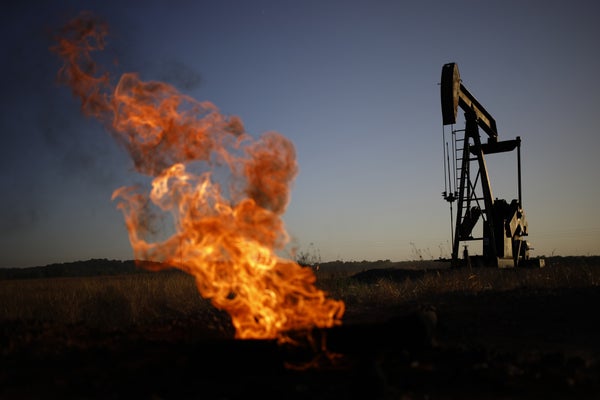CLIMATEWIRE | EPA finalized regulations Tuesday for a fee that oil and gas companies could begin paying on excess methane emissions next year — if Republicans don’t repeal it first.
The rule guides implementation of a levy created by the 2022 climate law and is the last important climate standard of the Biden administration. It was unveiled at an event on the sidelines of this year’s U.N. climate conference in Baku, Azerbaijan, shortly before a U.S.-China methane summit.
EPA Administrator Michael Regan, who did not attend the global meeting, said in a statement that the rule is “the latest in a series of actions under President Biden’s methane strategy to improve efficiency in the oil and gas sector, support American jobs, protect clean air, and reinforce U.S. leadership on the global stage.”
On supporting science journalism
If you're enjoying this article, consider supporting our award-winning journalism by subscribing. By purchasing a subscription you are helping to ensure the future of impactful stories about the discoveries and ideas shaping our world today.
EPA estimated that the levy would keep 1.2 million metric tons of methane out of the atmosphere through 2035 and deliver “up to $2 billion” in climate benefits.
Companies will begin paying the levy next year for excess emissions released in 2024. Oil and gas operators will pay $900 for each metric ton of methane that's above a threshold enshrined in the Inflation Reduction Act. The fee, called the waste emissions charge, will climb to $1,500 a ton for 2026 and beyond. The levy reinforces EPA’s Clean Air Act rules for methane by ensuring that if operators aren’t covered by those standards — or don’t comply with them — they would pay the fee.
But President-elect Donald Trump’s victory last week throws doubt on the future of President Joe Biden’s methane policies — particularly the methane fee. Trump could direct former Rep. Lee Zeldin, a New York Republican whom Trump announced as his future EPA administrator Monday, to pare back elements of those policies or scrap them. Zeldin faces Senate confirmation.
The Biden EPA has rolled out important methane rules at each of the last three U.N. climate summits. The administration has also built its climate diplomacy around the need to curb methane — a superpollutant that's 80 times more powerful than carbon dioxide at raising temperatures over a 20-year time horizon.
The U.S. joined the European Union in 2021 to launch the Global Methane Pledge, which has resulted in more than 150 countries promising to work together to reduce global methane at least 30 percent by 2030. The U.S. summit with China on Tuesday marks the second time the biggest two polluters are meeting to curb the potent gas.
But under Trump, EPA could quickly begin the process of pulling back and replacing Biden-era methane rules with laxer standards — including those that drive implementation of the methane fee. Because the rule is being finalized so late in Biden's term, Republican lawmakers could invalidate it through a Congressional Review Act resolution.
But experts say those moves wouldn’t absolve Trump’s EPA from having to implement the fee.
“The law is still the law,” said one industry advocate who was granted anonymity to talk about future policies.
A CRA resolution would allow the Trump administration to craft a more industry-friendly methane fee. It could, for instance, make it easier for oil and gas operators to claim fee exemptions offered under the Inflation Reduction Act. Trump could also let operators delay paying the fee until their annual greenhouse gas reports are finalized late in the year. The Trump EPA could also allow corporations to net emissions across all assets, removing restrictions on how cleaner facilities may compensate for dirtier ones to mitigate fees.
If Trump and congressional Republicans wish to kill the methane fee, they would have to enact legislation to repeal it. Democrats and Biden moved the IRA through the annual budget process, and the GOP could potentially use the same maneuver to undo parts of it. Trade groups like the American Petroleum Institute and Independent Petroleum Association of America oppose the fee.
Rosalie Winn, an attorney with the Environmental Defense Fund, said legislation to scrap the fee “would be directly contrary to the interests of the American people.”
“We know that reducing methane pollution is the single most important and lowest-cost way to lower the warming that we are experiencing today and to protect the communities across America that are already being affected by extreme weather events and rapidly increasing insurance costs,” she said, noting that the methane fee is a revenue raiser and its repeal would add to the federal deficit.
Although the fee is unpopular with industry, not all of Biden's other methane policies are.
EPA is on track to release hundreds of millions of dollars from the IRA in the coming weeks to help operators slash emissions. Many oil and gas industry advocates fear that jettisoning EPA rules for leak prevention and monitoring could leave U.S. companies vulnerable to international and state methane policies. They also note that many operators have their own climate commitments that are roughly in line with EPA’s methane rule.
This story also appears in Energywire.
Reprinted from E&E News with permission from POLITICO, LLC. Copyright 2024. E&E News provides essential news for energy and environment professionals.
